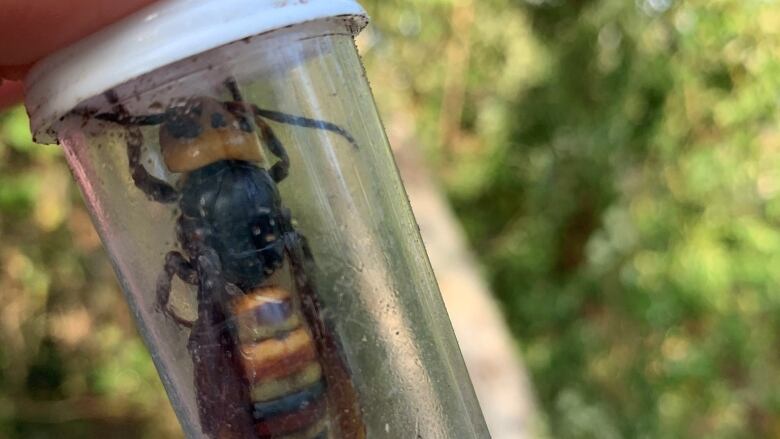Remains of giant hornet found in B.C., experts say
No cause for concern unless DNA analysis indicates possibility of new nest, bee expert says

The remains of another gianthornethave been found in B.C.'s Lower Mainland, but the province's resident bee expert said there is likely no reason for residents to worry.
The insect, sometimesknownas the "murder hornet," was found dead in a Japanese beetle trap in south Surreyon Oct. 22.
It was only about 200 metres away from the Canada-U.S. border,not far from the area in Whatcom Countywhere U.S. officialsfound and destroyed four nests in late September.
Paul van Westendorpsaidthe "very small" hornetfound in B.C. wasabout 33millimetresin size, or less than half the size of a large mating queen.
"Its small size and itspoor condition suggest it was in [the trap]for some weeks, and we believe it was probably caught in there in late September, and that coincided with the latest nest destruction ...that theWashington folks did,"van Westendorp said in an interview Wednesday.
"Likely, this was a sterile worker who is not part of the mating process and therefore, we thought it was not really of great significance."
In a statement, the Washington State Department of Agriculture agreed it's likely the hornet came from one of its nests.
Van Westendorp, an apiculturist, said the hornet has been sent to Ottawa for DNA analysis to confirm whether it was from one of the U.S. nests.
There will be far more cause for concern, he said, if theanalysis says the hornet wasn't from one of those nests because that would increase the likelihood the invasive insects are breeding and spreading in B.C.
"Then we would have a much more interesting situation on our hands," he said.
Gianthornets, originally from Asia, are the world's largest hornetsand a small group of them can kill an entire honeybee hive in a matter of hours. They are an invasive species in the Pacific Northwest and pose a real threat to pollinators on both sides of the border.
Van Westendorp said officials have been surveying the Canadian side of the border in the area where the hornet was found and have not found another specimen.
Anyone who believes they've seen one of the hornets is asked to send a photo to researchersand not to touch it.
With files from Ali Pitargue












_(720p).jpg)


 OFFICIAL HD MUSIC VIDEO.jpg)
.jpg)



























































































